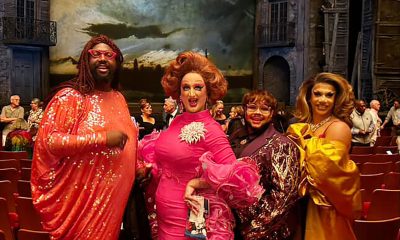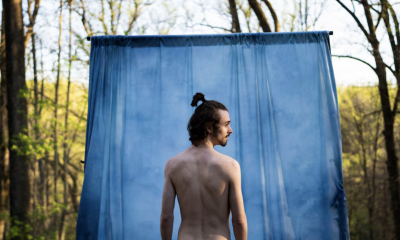Obituary
D.C. theater community mourns passing of H. Lee Gable
Served as director, producer, administrator for more than three decades

H. Lee Gable, a well-known figure in the D.C. theater community for more than 30 years and was the founding Artistic Director of D.C.’s Rainbow Theatre Project, died suddenly on July 26, 2024, according to a statement released by Rainbow Theatre Project publicist Alexandra Nowicki.
The statement says Gable, 62, served as artistic director for the Rainbow Theatre Project from the time of its founding in 2013 to 2022. The project describes itself on its website as a “premier theatre for the Lesbian, Gay, Bisexual, Transgender & Queer (LGBTQ) community in the Nation’s Capital by presenting plays and musicals that reflect the unique experiences, interests and history of the LGBTQ community.”
According to the statement, Gable’s longstanding involvement in theatrical endeavors includes administrative positions with the Kennedy Center for the Performing Arts, the Washington Shakespeare Company, the Shakespeare Theatre Company, the Studio Theatre, and the Helen Hayes Awards.
It says he served as Founding Artistic Director for the Phoenix Theatre from 1998 to 2000, and as Director for the Washington Shakespeare Company from 2004 to 2006. He also served as Managing Director for the Washington Shakespeare Company for its 2006 to 2007 season, where he directed the plays “The Night of the Iguana,” “The Children’s Hour,” and “Private Lives,” the statement says.
For the Phoenix Theater, Gable directed the plays “Inside/Out,” “The White House Murder Case,” and “3 by Sylvia.” As if that were not enough, it says he directed the plays “God of Hell” for the Didactic Theatre and “Ballycastle” for the Source Theatre Festival.
It adds that for the Rainbow Theatre Project, Gable directed the plays “Get Used To It” and “In The Closet.”
The statement says at the time of his death, Gable was serving as a treasurer for the Kennedy Center for the Performing Arts. It says a memorial service is being planned for this autumn.
Obituary
Longtime DC resident Thomas Walsh dies at 87
Pa. native’s husband was by his side when he passed away
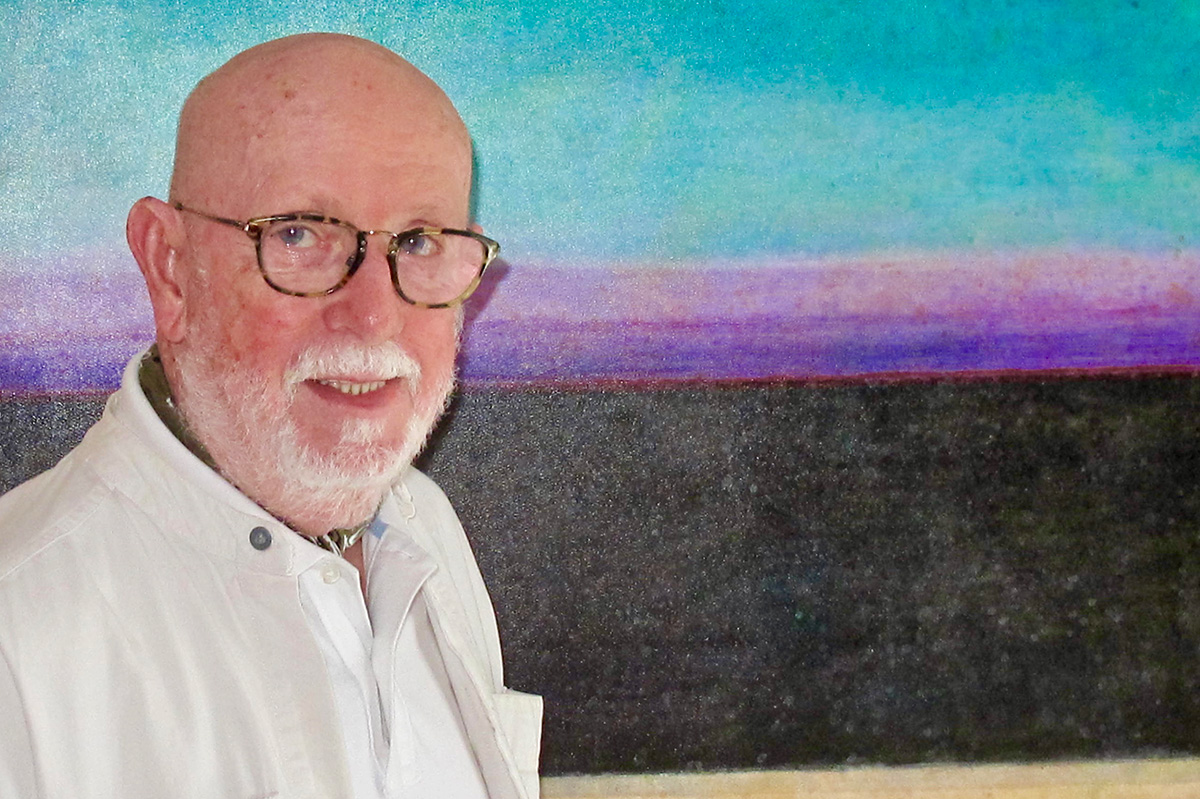
Long-time D.C. resident Thomas Walsh died on May 16. He was 87.
Walsh was born on Sept. 17, 1937, in Scranton, Pa. His family later moved to Levittown, Pa.
Walsh met his husband, Anthony Carcaldi, at the Blue Note, a gay bar in Asbury Park, N.J., in 1964.
“I walked in the bar with friends from New York City,” recalled Carcaldi. “I looked at the piano and this person was singing … and all I noticed were his blue eyes.”
Walsh was singing “Because of You.”
“I walked up to the piano while Tom was singing and stared at him, which caused him to forget the words,” said Carcaldi. “He composed himself and started from the beginning.”
Carcaldi and Walsh became a couple in 1965, a year after they met, when they moved to Philadelphia.
“We moved in together and have been together ever since,” said Carcaldi.
Walsh was a freelance graphic designer until he accepted a job in Temple University’s audiovisual department. Walsh and Carcaldi moved to D.C. in 1980.
Walsh began a graphic design business and counted Booz Allen as among his clients. Carcaldi said one of his husband’s “main loves was painting,” and became a fine artist in 2005.
Walsh showed his art at the Nevin Kelly Gallery on U Street, the Martha Spak Studio near the Wharf, and at the Wexler Gallery in Philadelphia. Walsh also sang with the Gay Men’s Chorus of Washington.
Walsh and Carcaldi married at D.C. City Hall in 2014.
“Tom and I have been together since 1964 until his death,” said Carcaldi. “Tom died peacefully with me at his side in bed on May 16, 2025, holding Tom in my arms as he made the transition out of life.”
A celebration of life will take place in September.
Obituary
Beloved schoolteacher, D.C. resident Patrick Shaw dies at 60
Colleagues, friends say he ‘touched so many lives’ with warmth, kindness
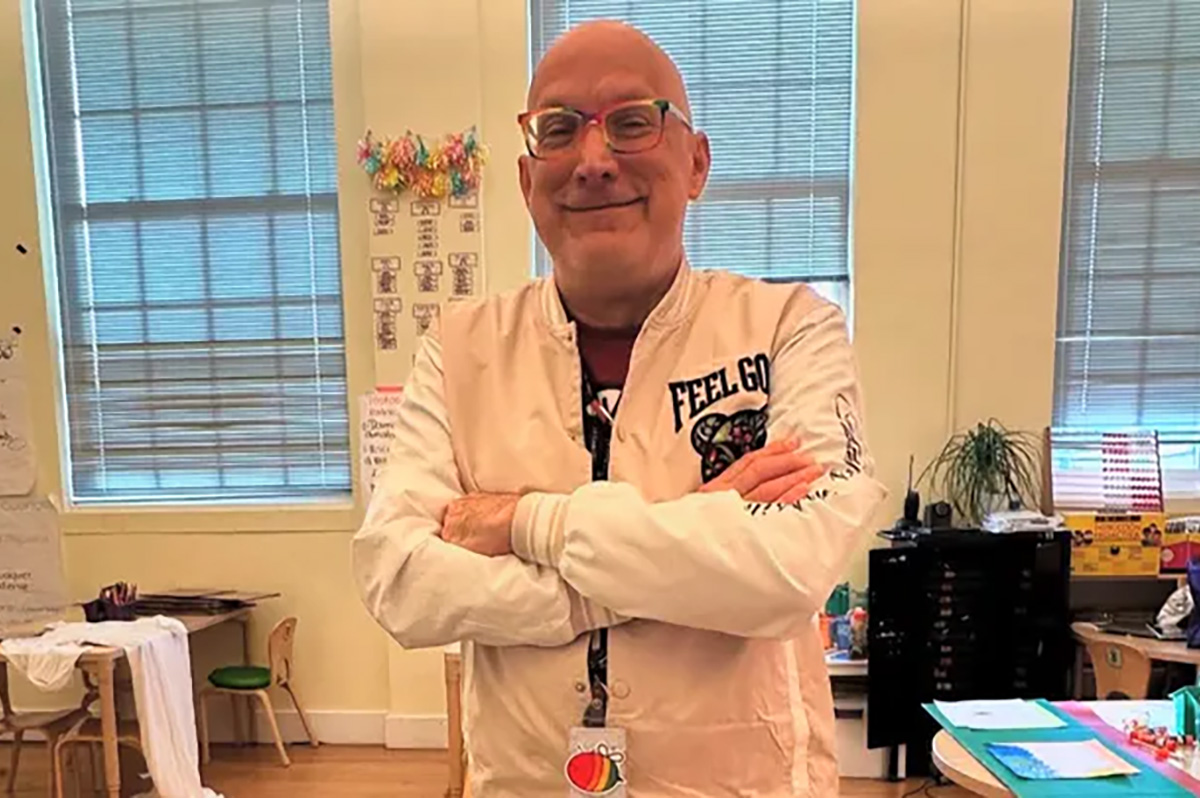
Patrick Dewayne Shaw, a highly acclaimed elementary school teacher who taught and served as vice principal in several D.C. schools since moving to the District in 2002, died April 19 at the age of 60.
His friend Dusty Martinez said his passing was unexpected and caused by a heart related ailment.
“Patrick touched so many lives with his warmth, humor, kindness, and unmistakable spark,” Martinez said in a statement. “He was a truly special soul – funny, vibrant, sassy, and full of life, and we are heartbroken by his loss,” Martinez wrote.
Among those reflecting on Shaw’s skills as an educator were his colleagues at D.C.’s Mundo Verde Bilingual Public Charter School, where he served as a second-grade special education teacher since August 2023.
“Patrick brought warmth, joy, and deep commitment to Mundo Verde,” his colleagues said in an Instagram posting. “His daily Broadway sing-alongs, vibrant outfits, and genuine love for his students filled our community with energy and laughter,” the posting says.
Biographical information provided by Martinez and Karen Rivera Geating, a senior inclusion manager at the Mundo Verde school and Shaw’s supervisor, shows Shaw had a distinguished 38-year teaching career and multiple degrees in the field of education.
He was born and raised in Little Rock, Ark., and graduated from Little Rock’s Catholic High School for Boys.
He received two bachelor’s degrees, one in philosophy from St. Meinrad Seminary College in Indiana and one in elementary education from the University of Minnesota in St. Paul.
The biographical information shows Shaw received three master’s degrees. One is in secondary education and history from the University of Arkansas at Little Rock. His second master’s degree is in special education from The Catholic University of Washington, D.C. His third master’s degree is in school administration from Trinity College in D.C.
Shaw began his teaching career in 1987 in Little Rock, Ark., as a fourth grade General Education Teacher at Our Lady of Good Counsel School and a short time later at Little Rock’s St. Theresa Catholic School as a fourth-eighth grade teacher through December 1989.
He next moved to Minnesota where he spent part of the 1990s as a fifth and sixth grade teacher and a physical education instructor, according to biographical information. His resume shows that from January 1995 to December 1998 he was associated with the Minnesota AIDS Project in Minneapolis.
He “recruited, interviewed and staffed volunteer education and transportation programs for people living with HIV and AIDS,” his resume states.
Shaw next returned to Little Rock where he served from January 1998 to December 2004 as Theology Department Chair at the Mt. St. Mary Academy. His work included creating theology lessons for ninth-12th graders and creating a social justice program for 12th graders.
Upon moving to D.C., Shaw served as classroom teacher and vice principal at several schools, including the D.C. Public School’s Benning Elementary School; vice principal at Chavez Prep Public Charter School; vice principal at Bridges Public Charter School; Special Education Coordinator at Monument Academy Public Charter School; and Special Education Case Management and Math Intervention Specialist at D.C.’s College Preparatory Academy for Boys.
“Patrick dedicated 38 wonderful years to teaching, from 1987 to 2025, inspiring generations of students with his passion, wit, and kindness,” Martinez said in his statement.
Shaw was predeceased by his mother, Myrna G. Shaw, and is survived by his father, Thomas H. Shaw, his brother, James Shaw (Michele), his sister, Angela Mahairi (Wafai), and his cherished niece and nephews Austin, Tariq, Reed, Ramy, and Jasmine, according to information provided by Martinez.
Martinez said a funeral mass would soon be held in Little Rock, Shaw’s hometown.
“His family will be honoring one of his last wishes,” Martinez wrote, “to be returned home and remembered in a unique and meaningful way” – by having a tree planted in his honor, “a living tribute to the full and beautiful life he lived.”
Details of the location of the planted tree will be shared soon to offer a place where “friends and family can visit, reflect, and stay connected with his spirit,” Martinez states.
In D.C. a celebration of life for Shaw is scheduled to be held Saturday, May 3, from 2-5 p.m. at JR.’s bar at 1519 17th Street, N.W. Martinez points out that the tribute will be held during JR.’s weekly Saturday “Showtunes” event, in which sing-along performances of famous Broadway musicals are shown on video screens.
“JR.’s Saturday Showtunes were one of Patrick’s absolute favorite traditions, and gathering in that spirit feels like the perfect way to honor him,” Martinez said.
“Many have asked how they can help,” Martinez concludes in his statement. “In response we’ve created a GoFundMe page to support funeral expenses, help find a loving home for Patrick’s beloved dog, Birdie, and assist with other needs during this difficult time.”
Any remaining funds, according to Martinez, will be donated to a charity “that reflects Patrick’s passions and values.”
The GoFundMe page can be accessed at: gofundme.com/f/honoring-patrick-shaws-vibrant-legacy.
Obituary
Local attorney, LGBTQ rights advocate Dale Sanders dies at 75
Acclaimed lawyer credited with advancing legal rights for people with HIV/AIDS
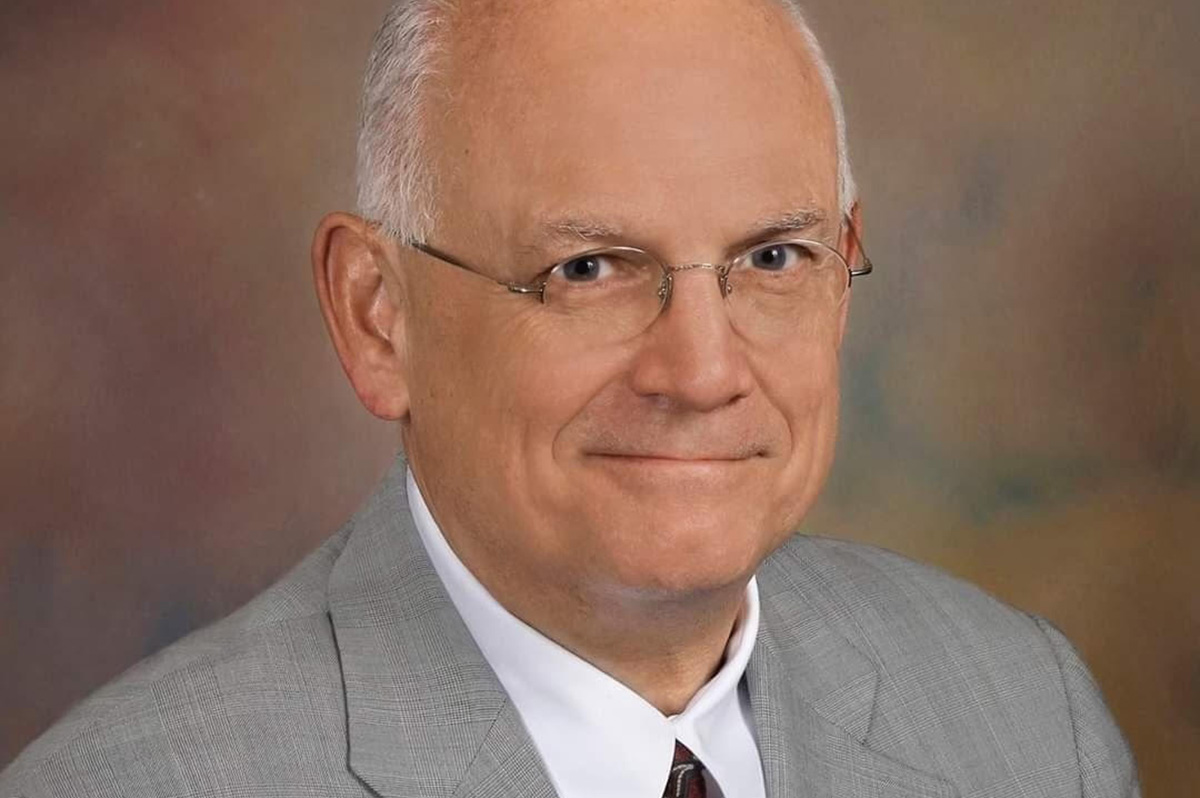
Dale Edwin Sanders, an attorney who practiced law in D.C. and Northern Virginia for more than 40 years and is credited with playing a key role in providing legal services for people living with HIV/AIDS beginning in the early 1980s, died April 10 at the age of 75.
His brother, Wade Sanders, said the cause of death was a heart attack that occurred at Johns Hopkins Hospital in Baltimore shortly after he had back surgery.
Wade Sanders described his brother as a “trial lawyer, passionate criminal defense, and civil litigator for human rights” for close to 50 years, with some of his work focused on “civil law, notably gay-related insurance discrimination during the AIDS epidemic.”
He called his brother “a zealous advocate for the oppressed, his clients, and his personal convictions.”
Born in Arlington, Va., and raised in McLean, Va., Dale Sanders graduated from Langley High School in McLean and received his bachelor’s degree from the University of Virginia, his brother said. He received his law degree from D.C.’s American University Washington College of Law and began his law practice in 1976 in Old Town, Alexandria, Wade Sanders said.
Amy Nelson, director of Legal Services for D.C. ‘s Whitman-Walker Health, said Sanders became one of Whitman-Walker’s original volunteer pro-bono attorneys in the 1980s.
“Dale was a beloved part of the legal services program and our medical-legal partnership for nearly 40 years,” Nelson said. “Dale was one of the clinic’s first volunteer attorneys at Whitman-Walker’s weekly, legal walk-in clinic offering free counseling to clients about their legal rights in the face of HIV/AIDS and LGBT discrimination from employers, landlords, medical providers, and insurance companies,” according to Nelson.
Nelson added, “Dale represented dozens of people impacted by the ignorance and prejudice attendant to an HIV/AIDS diagnosis, and his litigation wins were instrumental in advancing the legal rights of persons living with HIV/AIDS.”
Sanders’s most recent case on behalf of Whitman-Walker took place in 2023 in support of a transgender woman in Virginia who faced discrimination from her employer and health insurer, Nelson said.
In 1989, Whitman-Walker presented Sanders with its Gene Frey Award for Volunteer Service, and in 1994 presented him with its Founders Award for Pro Bono Legal Services, Nelson told the Blade. She said in 2024, Whitman-Walker re-named its annual Going the Extra Mile Pro Bono Award as the Dale Sanders Award for Pro Bono Excellence.
“Dale’s legacy helped to shape HIV/AIDS law, and his fierce commitment to justice will live on at Whitman-Walker Health,” Nelson said in a statement. “We will miss him dearly.”
Daniel Bruner, who served as Whitman-Walker’s legal services director prior to Amy Nelson taking that position, said Sanders played a role in shaping his own legal skills and knowledge.
“Dale was one of my earliest legal models among local, and national, advocates for people living with HIV and LGBT people,” Bruner told the Blade. “He was a fierce, persistent advocate for his clients and for the community,” Bruner said, adding, “He won key victories in several cases where employees’ or health care patients’ privacy had been egregiously violated. I certainly will never forget him.”
Wade Sanders said his brother was also an avid bridge player, saying he played competitively. “He earned the rank of Ruby Life Master, a pretty big deal in the bridge world,” Wade Sanders said.
Dale Sanders is survived by his husband, Christian Samonte; his sister, Joyce Sanders of York, S.C.; his brother Wade Sanders of West Jefferson, N.C.; and his beloved dogs Langley and Abigail, his brother said in a statement.
A memorial service for Dale Sanders organized by the Sanders family and the LGBTQ Catholic group Dignity Washington will be held Saturday, May 10, at 1 p.m. at St. Margaret’s Episcopal Church at 1830 Connecticut Ave., N.W. in D.C., a Dignity Washington spokesperson said.
-

 Virginia1 day ago
Virginia1 day agoDefying trends, new LGBTQ center opens in rural Winchester, Va.
-

 South Africa4 days ago
South Africa4 days agoLesbian feminist becomes South African MP
-

 Travel3 days ago
Travel3 days agoManchester is vibrant tapestry of culture, history, and Pride
-

 Opinions2 days ago
Opinions2 days agoUSAID’s demise: America’s global betrayal of trust with LGBTQ people



